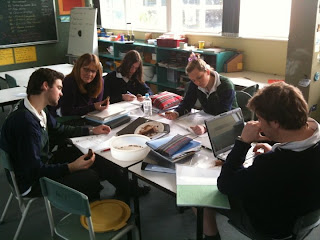When I wrote my first post on this blog about things I'd do differently in another lifetime, student exchange is one of the things I should have listed. Unfortunately I didn't have the confidence or the bravery to do it and here I am many years later, still only dreaming about visiting places like France, so I am looking forward to sharing a vicarious journey with Mitch.
I like to think that as a school we have contributed something to Mitchell's decision to make this trip. He is a remarkable boy by nature, a caring and inquisitive soul with an empathy for others and a strong sense of justice but he hasn't always been as outgoing and confident as he is now. Since year 5 however, he has taken every opportunity offered to him and it has been very rewarding to watch his personal growth. As one of our Performing Artists he has been shot on the battlements as 'Gavroche', cavorted around the stage in a lycra body suit as 'Mungojerry' and perfected a magnificent hair flick and sung an (almost) high C as 'Sir Galahad'. As a member of the Kapahaka group, he has stripped to the waist and performed countless haka with such mana and conviction that he has been left bleeding. Once you've shown the confidence to do that, a few months in a foreign country is a trifling matter!
Mitch has been on our NZ camp twice and didn't waste a second of the time that he was there.
Last year Mitchell had the opportunity to attend the Alpine School program at Glenormiston. For 9 weeks, he and three other students developed their leadership skills in a technology, junk food free environment. They came home changed, invigorated, motivated and ready to take on the world as valuable contributors to their society. From that experience, Mitchell's desire to go on exchange was born. It is testament to his strength of mind and the support of his family that having decided this was a good thing to do, he went about doing it!
Last year, another of our stunningly successful students Emily, spent 5 months in Italy and hopefully these two have set a precedent for many more of our kids to follow. There's nothing wrong with growing up in a tiny town like Mortlake when the world is just outside your doorstep.
And so, armed with 12 months of French by correspondence and a 'take it as it comes and expect the best 'attitude, Mitchell will board a plane tomorrow , followed by a train on Sunday, to Marseilles, where he will sacrifice his Summer holidays to spend the next 5 months at school.
We know that he will charm his new friends and family and have a magnificent adventure.
Ayez un temps magnifique. Coffre-fort de voyage. Voir-vous en Janvier :-)






